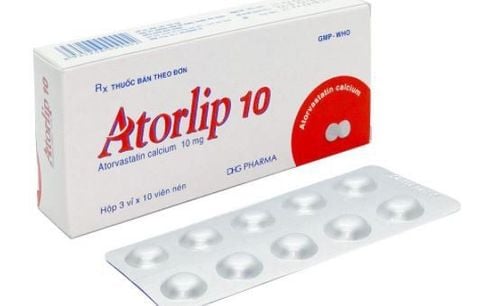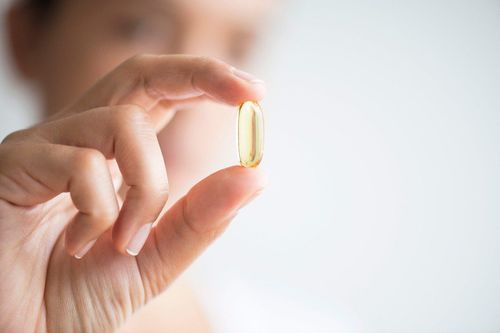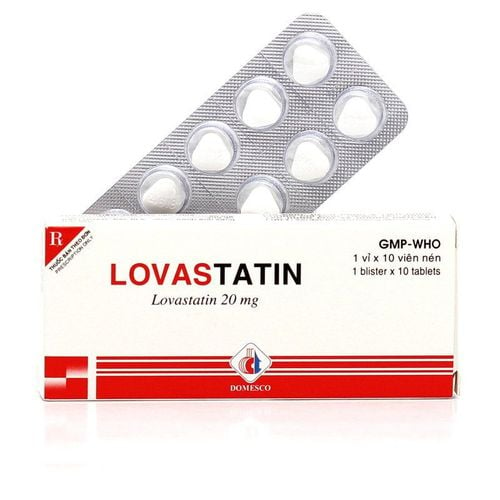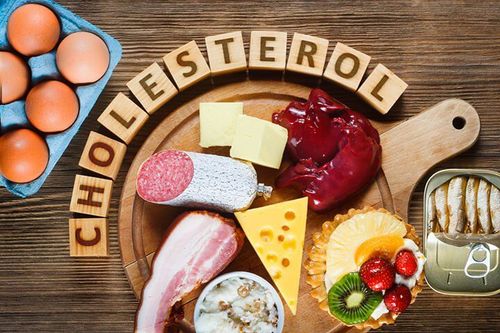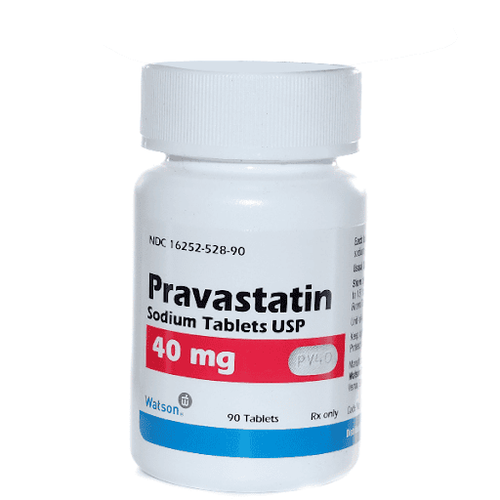This is an automatically translated article.
Cholesterol is a waxy substance produced by the liver and obtained by eating a lot of animal products such as meat, dairy and eggs. Having high levels of bad cholesterol (LDL), especially when oxidized, can increase the risk of heart disease and stroke. Here are 10 tips to lower blood cholesterol with your diet.
1. Eat foods rich in soluble fiber to lower blood cholesterol
Soluble fiber is commonly found in large amounts in legumes, whole grains, flaxseeds, apples, and citrus. The human body often lacks the right enzymes to break down soluble fiber, so when it passes through the digestive tract, these fibers will absorb water and form a paste. During transit, soluble fiber is absorbed with bile, a substance produced by the liver that helps digest fats. Finally, both the fiber and the accompanying bile are excreted in the stool. On the other hand, bile is made from cholesterol, so when the liver needs to make more bile, they pull cholesterol out of the blood, which lowers blood cholesterol. According to recent studies, regularly consuming foods rich in soluble fiber can reduce both total cholesterol and LDL cholesterol levels by 5-10% within just 4 weeks. Ideally, you should eat at least about 5-10 grams of soluble fiber per day to be able to reduce the maximum cholesterol level in the body.

Thường xuyên tiêu thụ các loại thực phẩm giàu chất xơ hòa tan có thể làm giảm từ 5-10% cả tổng lượng cholesterol toàn phần
2. Add more fruits and vegetables
Eating a lot of fruits and vegetables is an extremely effective measure to help lower blood cholesterol. Research results show that adults who consume at least 4 servings of fruits and vegetables per day have about 6% lower LDL cholesterol levels than those who eat less than 2 servings per day.
Besides, fruits and vegetables also provide many antioxidants that help prevent the oxidation of LDL cholesterol and the formation of plaque in the arteries. In addition, effects such as lowering bad cholesterol and antioxidants also help significantly reduce the risk of heart disease. According to some studies, people who eat a lot of fruits and vegetables have a 17% lower risk of heart disease than those who consume the least of them.
3. Use Herbs and Spices
Most herbs and spices are good sources of vitamins, minerals and antioxidants. Scientists have shown that garlic, turmeric, and ginger are particularly effective at lowering blood cholesterol when eaten regularly. In fact, just eating one clove of garlic per day for 3 months is enough to lower total cholesterol by 9%.
Besides lowering cholesterol, herbs and spices are also rich in antioxidants that help prevent the bad LDL cholesterol from oxidizing, thereby reducing the formation of plaque in the arteries.
Dried oregano, sage, mint, thyme, cloves, coriander, cumin, marjoram, chili pepper and cinnamon are the herbs with the highest antioxidant content.
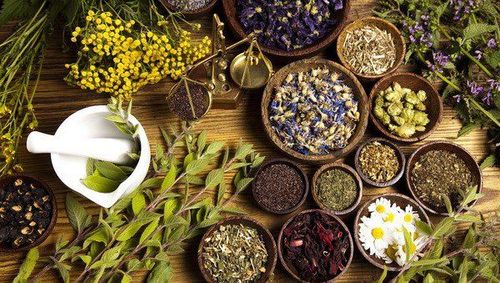
Các loại thảo mộc có thể giúp giảm cholesterol trong máu khi ăn thường xuyên
4. Consume a variety of unsaturated fats
Normally, there are two main types of fats found in foods, saturated and unsaturated fats.
On a chemical level, saturated fats contain no double bonds and are very straight, which makes them tightly bound and solid at room temperature. Meanwhile, unsaturated fats contain at least one double bond and have a bent shape, preventing them from being tightly bound together. These properties make them liquid at room temperature.
Studies show that replacing most saturated fats with unsaturated fats in your daily diet can reduce total cholesterol by up to 9% and bad LDL cholesterol by 11% in just 8 weeks. . Several long-term studies have also found that people who consume more unsaturated fat and less saturated fat tend to have lower cholesterol levels over time.
Foods like avocados, olives, nuts and seeds are all high in heart-healthy unsaturated fats, so you should eat them more often.
5. Avoid artificial trans fats
Although trans fats occur naturally in red meats and dairy products, the main source of trans fat that people commonly consume today is artificial trans fat, often found in foods. processed foods.
Artificial trans fats are produced by hydrogenating or adding hydrogen to unsaturated fats such as vegetable oils to change their structure and solidify at room temperature.
In fact, artificial trans fats are gradually replacing natural saturated fats, and are widely used by restaurants and food manufacturers. Studies show that eating artificial trans fats can increase LDL cholesterol levels and lower good HDL cholesterol in the body, leading to a 23% higher risk of heart disease.
You should also be careful with words like “partially hydrogenated” in the ingredient lists of foods. This term implies that the food contains trans fats and should be avoided.
Although naturally occurring trans fats found in meat and dairy products can also raise LDL cholesterol levels, they are only insignificant to the extent that they pose major health risks.
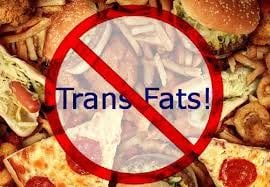
Ăn chất béo trans nhân tạo có thể làm tăng mức cholesterol LDL và làm giảm cholesterol tốt HDL trong cơ thể
6. Eat less sugar
Consuming too much sugar can increase cholesterol levels in the body. The results of one study showed that adults who consumed 25% of the calories in drinks made with high-fructose corn syrup increased their LDL cholesterol levels by 17% in just 2 weeks. .
Fructose can even increase the number of small and dense oxidized LDL cholesterol particles that contribute to heart disease. The American Heart Association has recommended that you eat no more than 100 calories (25 grams) of added sugars per day for women and children, and no more than 150 calories (37.5 grams) per day for men. . You can definitely meet these goals by reading food labels carefully and choosing products that don't add a lot of sugar during processing.
7. Adopt a Mediterranean Diet
One of the simplest ways to incorporate the lifestyle changes above is to follow the Mediterranean diet. This is a nutritious diet rich in olive oil, fruits, vegetables, nuts, whole grains and fish, while consuming little meat and most dairy. Of these, alcohol (usually in the form of red wine) is consumed in moderation with meals.
Because this eating style includes a variety of foods that reduce cholesterol in the blood, it is very good for heart health. In fact, researchers have shown that following the Mediterranean-style diet for at least three months reduces LDL cholesterol by an average of 8.9 mg per deciliter (dL). In addition, it also reduced the risk of cardiovascular disease by 25% and the risk of death by 47% when followed for at least 4 years.
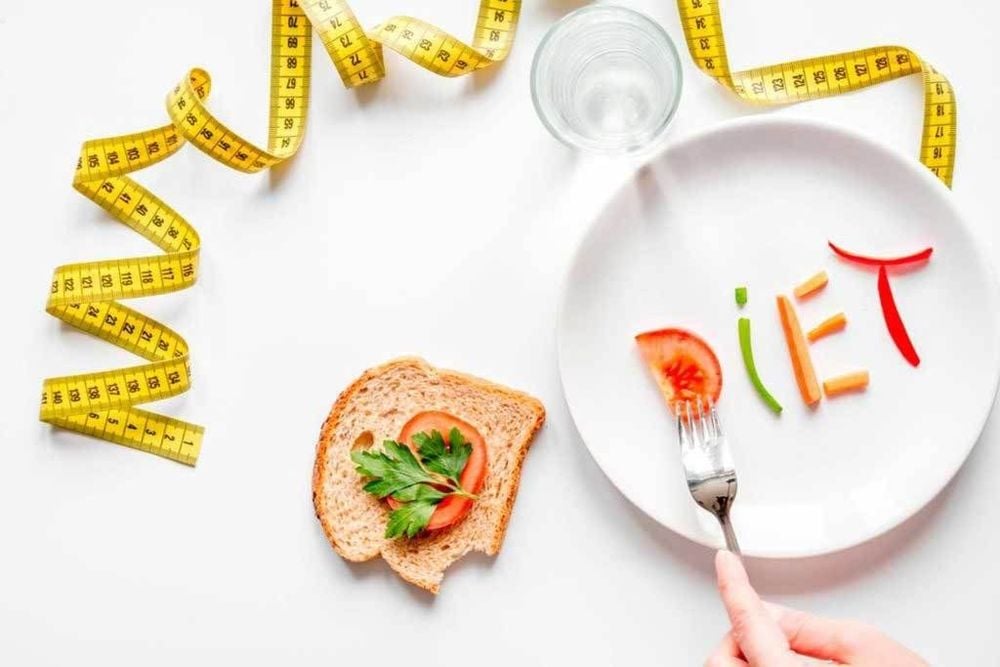
Nếu tuân theo chế độ ăn kiêng kiểu Địa Trung Hải trong ít nhất ba tháng sẽ làm giảm cholesterol LDL
8. Eat a lot of soy
Soybeans are rich in protein and isoflavones - plant compounds that are structurally similar to estrogen. These substances work to lower bad cholesterol and prevent the risk of heart disease. In fact, eating soybeans every day for at least a month can increase good HDL cholesterol by 1.4 mg/dL and decrease bad LDL cholesterol by about 4 mg/dL.
Generally, less processed forms of soy like soy milk are more effective at lowering cholesterol than processed protein fortified soy.
9. Drink green tea
Green tea is a very easy plant to prepare that offers many outstanding health benefits. Tea leaves can be steeped in hot water to make tea or ground into a powder and mixed with liquid to form matcha green tea. One study found that consuming green tea every day for at least 2 weeks reduced total cholesterol by about 7 mg/dL and bad LDL cholesterol by about 2 mg/dL.
In addition, green tea is also rich in antioxidants, which can prevent the oxidation of LDL cholesterol and the formation of plaque in the arteries. Just enjoying one cup of green tea a day can reduce the risk of heart attack by almost 20%, and drinking at least 4 cups a day offers the best protection against heart disease.

Trà xanh là một loại thực vật rất dễ chế biến mà mang lại nhiều lợi ích nổi bật đối với sức khỏe
10. Use Supplements
Here are some supplements that can lower cholesterol levels naturally, including:
Niacin: Supplementing with about 1-6 grams of niacin per day can lower LDL cholesterol levels by up to 19% within a day. five. However, this supplement can cause some side effects and should only be used under the direction of a doctor. Psyllium husk powder: Very rich in soluble fiber, can be mixed with water and consumed daily to lower cholesterol levels. L-Carnitine: Helps lower LDL levels and reduce oxidation for people with diabetes. Taking 2 grams of L-carnitine daily for 3 months can reduce oxidized cholesterol levels more than 5 times compared with a placebo. However, you should consult with your doctor before starting any new diet or supplement.
Vinmec International General Hospital with a system of modern facilities, medical equipment and a team of experts and doctors with many years of experience in medical examination and treatment, patients can rest assured to visit. examination and treatment at the Hospital.
Please dial HOTLINE for more information or register for an appointment HERE. Download MyVinmec app to make appointments faster and to manage your bookings easily.
Reference source: healthline.com





